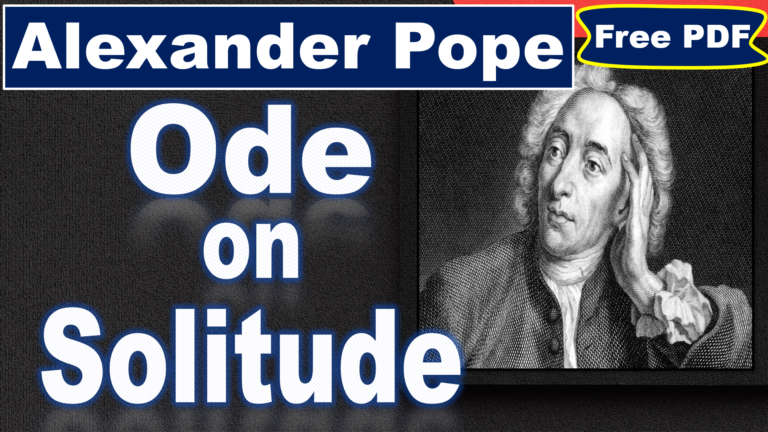Essay Type Questions
Q. Write the critical appreciation of the poem “On Shakespeare” by John Milton?
Introduction
John Milton’s “On Shakespeare. 1630” is a sonnet that praises Shakespeare’s greatness and argues that his work is his own best monument. The poem is full of rich imagery and complex poetic devices, and it offers a unique and insightful perspective on Shakespeare’s legacy.
Theme
The main theme of the poem is the enduring legacy of Shakespeare’s work. Milton suggests that Shakespeare’s poetry is so powerful and beautiful that it will be remembered and celebrated for generations to come. He writes:
Thou in our wonder and astonishment
Hast built thyself a live-long monument.
Milton is saying that Shakespeare’s poetry is his own best monument, because it is so enduring and impactful.
Structure and Form
This 16-line poem is written in a single stanza. The lines are organized into rhyming pairs, known as heroic couplets. A heroic couplet , to be more particular, is a specific type of couplet that primarily focuses on the heroic themes of someone or something . Milton also chose to use iambic pentameter, a common metrical pattern that was also favoured by Shakespeare.
The poem’s structure is carefully crafted to support its theme. The first quatrain introduces the question of what kind of monument Shakespeare needs for his remains. The second quatrain suggests that Shakespeare does not need a physical monument, because his work is his own best monument. The third quatrain praises Shakespeare’s writing, comparing it to the prophecies of the Oracle of Delphi. The final couplet concludes by saying that Shakespeare’s tomb is his own poetry, and that kings for such a tomb would wish to die.
Poetic Devices
Milton uses a variety of poetic devices in the poem to create a vivid and memorable image of Shakespeare and his work. Some of the poetic devices he uses include:
Metaphor: Milton uses metaphor to compare Shakespeare’s poetry to the Delphic Oracle and to a tomb. These metaphors suggest that Shakespeare’s poetry is profound, insightful, and enduring.
Simile: Milton uses simile to compare Shakespeare’s poetry to music. This simile suggests that Shakespeare’s poetry is beautiful, harmonious, and moving.
Personification: Milton personifies Shakespeare’s poetry by giving it the ability to build a monument and to take up residence in a tomb. This personification suggests that Shakespeare’s poetry is a living, breathing thing with its own power and agency.
Tone and Style
The tone of the poem is respectful, admiring, and reverential. Milton is clearly in awe of Shakespeare and his work. His style is eloquent, complex, and beautiful. He uses a variety of poetic devices to create a rich and evocative image of Shakespeare and his poetry.
Critical Commentary
Milton’s “On Shakespeare. 1630” is a powerful and eloquent tribute to one of the greatest poets in the English language. The poem is full of rich imagery and complex poetic devices, and it offers a unique and insightful perspective on Shakespeare’s legacy.
One of the things that makes the poem so effective is Milton’s use of metaphor and simile. By comparing Shakespeare’s poetry to the Delphic Oracle and to music, Milton suggests that Shakespeare’s poetry is profound, insightful, and beautiful. He also suggests that Shakespeare’s poetry has the power to move and inspire people.
Another thing that makes the poem so effective is Milton’s use of personification. By giving Shakespeare’s poetry the ability to build a monument and to take up residence in a tomb, Milton suggests that Shakespeare’s poetry is a living, breathing thing with its own power and agency.
Overall, Milton’s “On Shakespeare. 1630” is a masterful poem that praises Shakespeare’s greatness and argues that his work is his own best monument. The poem is full of rich imagery and complex poetic devices, and it offers a unique and insightful perspective on Shakespeare’s legacy.
Conclusion
Milton’s “On Shakespeare. 1630” is a timeless poem that celebrates the greatness of one of the greatest poets in the English language. The poem is full of rich imagery and complex poetic devices, and it offers a unique and insightful perspective on Shakespeare’s legacy. Milton’s poem is a fitting tribute to Shakespeare’s genius, and it continues to inspire and resonate with readers today.










